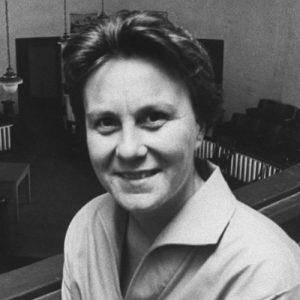Harper Lee was born Nelle Harper Lee on April 28, 1926, in Monroeville, Alabama. She was the youngest of four children born to Frances Cunningham Finch and Amasa Coleman Lee. Her mother, Frances, was a homemaker, and her father, Amasa, was a lawyer and newspaper editor.
Lee’s family had a long history in Alabama. Her grandfather, who was also a lawyer, served as a state senator and was the inspiration for the character of Atticus Finch in Lee’s novel “To Kill a Mockingbird.” Lee’s mother, Frances, was known for her wit and intelligence, and she was a strong influence on Lee’s writing.
Lee grew up in a small town, which would later serve as the setting for her famous novel. She was a tomboy and enjoyed playing outside with her brothers and their friends. She was also an avid reader and spent many hours at the local library. Lee attended the local public schools and graduated from Monroe County High School in 1944.
After high school, Lee attended Huntingdon College in Montgomery, Alabama. However, she dropped out after one year and transferred to the University of Alabama in Tuscaloosa. There, she studied law for a year before deciding to focus on her writing.
Harper Lee’s development as a writer began in her childhood, as she was an avid reader and spent many hours at the local library. She also wrote for her high school newspaper and literary magazine, where she developed her writing skills and found her passion for storytelling.
After dropping out of law school at the University of Alabama, Lee moved to New York City in 1949, where she worked as a ticket agent for Eastern Air Lines. In her spare time, she began writing stories and essays, which she shared with her friends, including Truman Capote.
In 1956, Capote invited Lee to join him in researching a story for The New Yorker about a murder in Kansas. The two traveled together to Kansas and spent several months interviewing locals and researching the case. Capote later turned their experiences into his famous book “In Cold Blood,” and Lee helped him with the research and writing process. entertainment News
During this time, Lee also worked on her own writing, including a manuscript for her first novel, “Go Set a Watchman,” which she submitted to a publisher in 1957. However, the publisher suggested that Lee rework the manuscript and focus on the character of Scout, the young girl in the story. Lee took the advice and spent the next few years working on what would become “To Kill a Mockingbird.”
Lee’s writing process for “To Kill a Mockingbird” was slow and meticulous. She wrote on a typewriter in her apartment in New York City and took breaks to visit her family in Alabama. She also had the support and guidance of her editor, Tay Hohoff, who helped her refine the story and develop the characters.
The publication of “To Kill a Mockingbird” in 1960 was a major success, and the book went on to win the Pulitzer Prize for Fiction in 1961. Lee became a household name and a celebrated author, but she remained private and humble about her success.
After the publication of “To Kill a Mockingbird,” Lee worked on several other writing projects, including a nonfiction book about a serial killer and a novel about a woman in a small town in Alabama. However, none of these projects were ever completed or published.
Overall, Harper Lee’s development as a writer was shaped by her love of storytelling, her experiences in Alabama and New York City, and the guidance of her editor, Tay Hohoff. Her dedication to the writing process and her willingness to take risks and try new things helped her become one of the most celebrated authors of the 20th century .
Harper Lee’s legacy and impact as an author have been profound, and her most famous novel, “To Kill a Mockingbird,” remains a beloved classic of American literature.
One of the most significant impacts of “To Kill a Mockingbird” has been its role in promoting racial justice and social change. The novel’s themes of racial inequality and injustice, as well as its portrayal of the character of Atticus Finch as a principled and empathetic lawyer who defends a Black man wrongly accused of a crime, have inspired generations of readers to fight against racism and discrimination.

“To Kill a Mockingbird” has also had a significant impact on the literary world. The novel has sold over 40 million copies worldwide and has been translated into more than 40 languages. It has been adapted into a successful film and stage play, which have brought the story to new audiences and helped solidify its place in popular culture.
In addition to her impact on literature and social justice, Harper Lee has also had an impact on the writing community. Many authors have cited “To Kill a Mockingbird” as a source of inspiration and have praised Lee’s writing style, which is known for its clear and concise prose, memorable characters, and timeless themes.
Harper Lee’s legacy has been celebrated and recognized through numerous awards and honors, including the Presidential Medal of Freedom, the National Medal of Arts, and the Alabama Academy of Honor. The Harper Lee Award for Legal Fiction was also established in her honor to recognize outstanding works of fiction that illuminate the role of lawyers in society.
In conclusion, Harper Lee’s impact as an author and advocate for social justice cannot be overstated. Her writing has touched millions of readers around the world, and her legacy as a pioneering voice for racial equality and human dignity continues to inspire new generations to work towards a more just and compassionate society
Harper Lee was known for being a very private person, and little is known about her personal life. She never married and had no children. She spent most of her adult life living in New York City, where she pursued her writing career.
In her later years, Lee suffered from poor health and became increasingly reclusive. She rarely gave interviews or made public appearances, but she remained an iconic figure in American literature.
Harper Lee passed away on February 19, 2016, at the age of 89. Her death was mourned by readers and literary figures around the world, who praised her contributions to literature and her commitment to social justice.
Lee’s family released a statement after her death, which read in part, “Her wit, her intelligence, and her love for her family and friends will be remembered by all who knew her, and her work will continue to inspire people around the world.”
Harper Lee’s death marked the end of an era in American literature, but her impact as an author and advocate for social justice will continue to be felt for generations to come




Leave a Reply